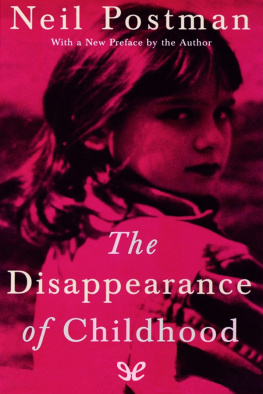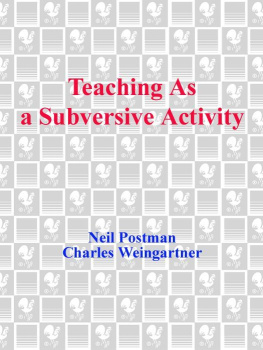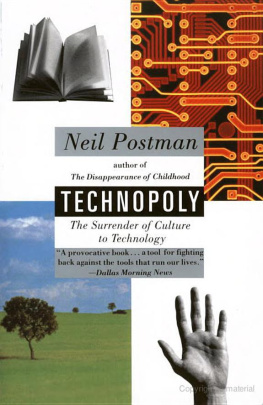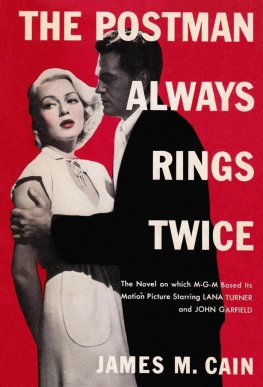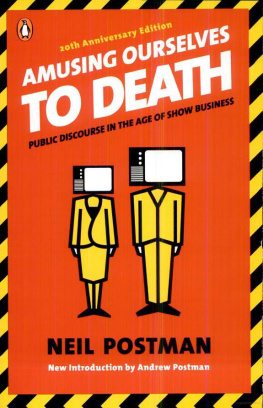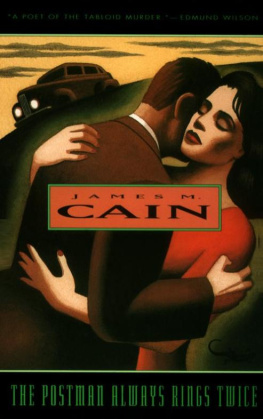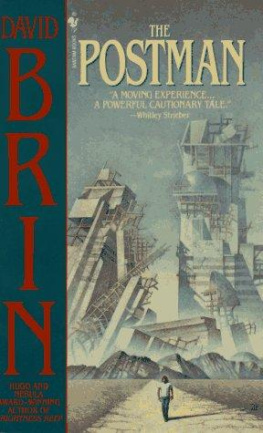Neil Postman - The Disappearance of Childhood
Here you can read online Neil Postman - The Disappearance of Childhood full text of the book (entire story) in english for free. Download pdf and epub, get meaning, cover and reviews about this ebook. year: 1982, publisher: ePubLibre, genre: Art. Description of the work, (preface) as well as reviews are available. Best literature library LitArk.com created for fans of good reading and offers a wide selection of genres:
Romance novel
Science fiction
Adventure
Detective
Science
History
Home and family
Prose
Art
Politics
Computer
Non-fiction
Religion
Business
Children
Humor
Choose a favorite category and find really read worthwhile books. Enjoy immersion in the world of imagination, feel the emotions of the characters or learn something new for yourself, make an fascinating discovery.
- Book:The Disappearance of Childhood
- Author:
- Publisher:ePubLibre
- Genre:
- Year:1982
- Rating:4 / 5
- Favourites:Add to favourites
- Your mark:
- 80
- 1
- 2
- 3
- 4
- 5
The Disappearance of Childhood: summary, description and annotation
We offer to read an annotation, description, summary or preface (depends on what the author of the book "The Disappearance of Childhood" wrote himself). If you haven't found the necessary information about the book — write in the comments, we will try to find it.
The Disappearance of Childhood — read online for free the complete book (whole text) full work
Below is the text of the book, divided by pages. System saving the place of the last page read, allows you to conveniently read the book "The Disappearance of Childhood" online for free, without having to search again every time where you left off. Put a bookmark, and you can go to the page where you finished reading at any time.
Font size:
Interval:
Bookmark:
Aris, Philippe. Centuries of Childhood, trans. by Robert Baldrick. New York: Random House, Vintage Books, 1962.
Arnheim, Rudolf. Film As Art. Berkeley: University of California Press, 1957.
Barincou, Edmond. Machiavelli. Westport, Conn.: Greenwood Press, 1975.
Barthes, Roland. Mythologies, trans. by Annette Lavers. New York: Hill & Wang, 1977.
Bettelheim, Bruno. The Uses of Enchantment: The Meaning and Importance of Fairy Tales. New York: Alfred A. Knopf, 1976.
Boorstin, Daniel J. The Image. New York: Harper & Row, Colophon Books, 1961.
. The Republic of Technology. New York: Harper & Row, 1978.
Burke, James. Connections. Boston: Little, Brown & Company, 1978.
Butler, Pierce. Origin of Printing in Europe. Chicago: University of Chicago Press, 1940.
Chaytor, H. J. From Script to Print. Cambridge, England: The University Press, 1945.
Cowley, Robert. Their Work Is Childs Play. Horizon, Vol. 13, No. 1, Winter 1971.
deMause, Lloyd. The Evolution of Childhood, in Lloyd deMause, ed., The History of Childhood. New York: The Psychohistory Press, 1974.
Dewey, John. The School and Society. Chicago: University of Chicago Press, 1899.
Donzelot, Jacques. The Policing of the Family. New York: Pantheon Books, 1979.
Du Boulay, F. R. H. An Age of Ambition: English Society in the Late Middle Ages. New York: Viking Press, 1970.
Eisenstein, Elizabeth. The Printing Press As an Agent of Change. Cambridge, England: Cambridge University Press, 1979.
Elias, Norbert. The Civilizing Process: The History of Manners. New York: Urizen Books, 1978.
Farson, Richard. Birthrights. New York: Macmillan, 1974.
Gilmore, Myron. The World of Humanism. New York: Harper & Brothers, 1952.
Gimpel, Jean. The Medieval Machine. New York: Holt, Rinehart & Winston, 1976.
Havelock, Eric. Origins of Western Literacy. Toronto: Ontario Institute for Studies in Education, 1976.
. The Coming of Literate Communication to Western Culture.Journal of Communication, Winter 1980.
Heilbroner, Robert. The Demand for the Supply Side. The New York Review of Books, Vol. 28, No. 10, June 11, 1981.
Holt, John. Escape from Childhood. New York: Ballantine Books, 1976.
Illick, Joseph. Child Rearing in Seventeenth Century England and America, in Lloyd deMause, ed., The History of Childhood. New York: The Psychohistory Press, 1974.
Langer, Susanne K. Feeling and Form. New York: Charles Scribners Sons, 1953.
Lasch, Christopher. Haven in a Heartless World: The Family Besieged. New York: Basic Books, 1977.
Lowenthal, Leo. Literature and the Image of Man. Boston: Beacon Press, 1957.
Mankiewicz, Frank, and Joel Swerdlow. Remote Control. New York: Ballantine Books, 1979.
Martin, Leonide. Health Care of Women. New York: J. B. Lippincott Company, 1978.
Masnick, George, and Mary Jo Bane. The Nations Families: 19601990. Boston: Auburn House, 1980.
McLuhan, Marshall. The Gutenberg Galaxy: The Making of Typographic Man. Toronto: University of Toronto Press, 1962.
Mead, Margaret. Culture and Commitment: A Study of the Generation Gap. Garden City, N. Y.: Doubleday & Co., 1970.
Mumford, Lewis. Technics and Civilization. New York: Harcourt, Brace & World, 1934.
Payne, George Henry. The Child in Human Progress. New York and London: G. P. Putnams Sons, 1916.
Pinchbeck, Ivy, and Margaret Hewitt. Children in English Society, Volume I: From Tudor Times to the Eighteenth Century. Toronto: University of Toronto Press, 1969.
. Children in English Society, Volume II: From the Eighteenth Century to the Children Act of 1948. Toronto: University of Toronto Press, 1973.
Plumb, J. H. The Great Change in Children. Horizon, Vol. 13, No. 1, Winter 1971.
Postman, Neil. Teaching As a Conserving Activity. New York: Delacorte Press, 1979.
Salomon, Gavriel. The Interaction of Media, Cognition, and Learning. San Francisco: Jossey-Bass, 1979.
Sennett, Richard. The Fall of Public Man. New York: Random House, Vintage Books, 1978.
Singer, Dorothy G., Jerome L. Singer, and Diana M. Zuckerman. Teaching Television: How to Use TV to Your Childs Advantage. New York: The Dial Press, 1981.
Steinberg, Sigfrid H. Five Hundred Years of Printing. Baltimore: Penguin Books, 1974.
Stone, Lawrence. The Educational Revolution in England, 15001640. Past and Present, No. 28, July 1964.
. Literacy and Education in England, 16401900. Past and Present, No. 42, February 1969.
Taylor, Isaac. The History of the Alphabet. New York: E. P. Dutton & Co., 1974.
Tuchman, Barbara W. A Distant Mirror. New York: Alfred A. Knopf, 1978.
Tucker, M. J. The Child as Beginning and End: Fifteenth and Sixteenth Century English Childhood, in Lloyd deMause, ed., The History of Childhood. New York: The Psychohistory Press, 1974.
Walzer, John F. A Period of Ambivalence: Eighteenth-Century American Childhood, in Lloyd deMause, ed., The History of Childhood. New York: The Psychohistory Press, 1974.
White, Lynn, Jr. Medieval Technology and Social Change. London: Clarendon Press, 1962.
Wishy, Bernard. The Child and the Republic. Philadelphia: University of Pennsylvania Press, 1968.
The Invention
of Childhood
The Disappearance
of Childhood
Children are the living messages we send to a time we will not see. From a biological point of view it is inconceivable that any culture will forget that it needs to reproduce itself. But it is quite possible for a culture to exist without a social idea of children. Unlike infancy, childhood is a social artifact, not a biological category. Our genes contain no clear instructions about who is and who is not a child, and the laws of survival do not require that a distinction be made between the world of an adult and the world of a child. In fact, if we take the word children to mean a special class of people somewhere between the ages of seven and, say, seventeen, requiring special forms of nurturing and protection, and believed to be qualitatively different from adults, then there is ample evidence that children have existed for less than four hundred years. Indeed, if we use the word children in the fullest sense in which the average American understands it, childhood is not much more than one hundred and fifty years old. To take one small example: The custom of celebrating a childs birthday did not exist in America throughout most of the eighteenth century
To take a more important example: As late as 1890, American high schools enrolled only seven percent of the fourteen-through seventeen-year-old population. Along with many much younger children, the other ninety-three percent worked at adult labor, some of them from sunup to sunset in all of our great cities.
But we must not confuse, at the outset, social facts with social ideas. The idea of childhood is one of the great inventions of the Renaissance. Perhaps its most humane one. Along with science, the nation-state, and religious freedom, childhood as both a social structure and a psychological condition emerged around the sixteenth century and has been refined and nourished into our own times. But like all social artifacts, its continued existence is not inevitable. Indeed, the origin of this book is in my observation that the idea of childhood is disappearing, and at dazzling speed. Part of my task in the pages to come is to display the evidence that this is so, although I suspect most readers will not require much convincing. Wherever I have gone to speak, or whenever I have written, on the subject of the disappearance of childhood, audiences and readers have not only refrained from disputing the point but have eagerly provided me with evidence of it from their own experience. The observation that the dividing line between childhood and adulthood is rapidly eroding is common enough among those who are paying attention, and is even suspected by those who are not. What isnt so well understood is where childhood comes from in the first place and, still less, why it should be disappearing.
Font size:
Interval:
Bookmark:
Similar books «The Disappearance of Childhood»
Look at similar books to The Disappearance of Childhood. We have selected literature similar in name and meaning in the hope of providing readers with more options to find new, interesting, not yet read works.
Discussion, reviews of the book The Disappearance of Childhood and just readers' own opinions. Leave your comments, write what you think about the work, its meaning or the main characters. Specify what exactly you liked and what you didn't like, and why you think so.

